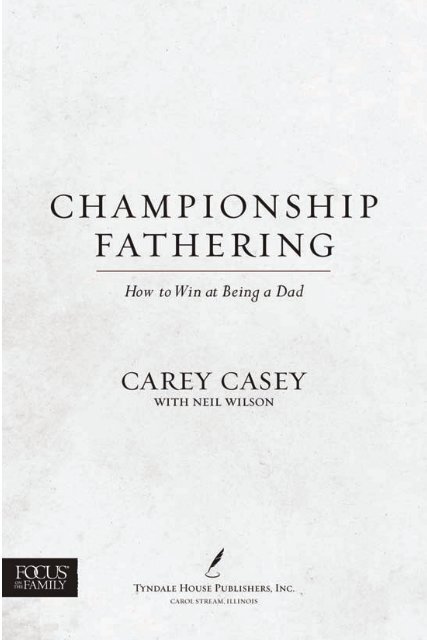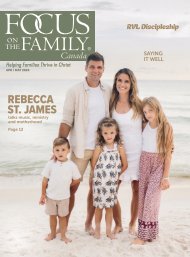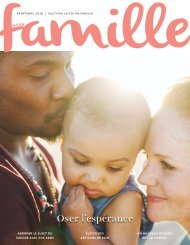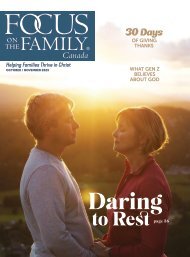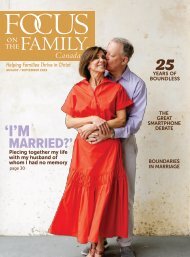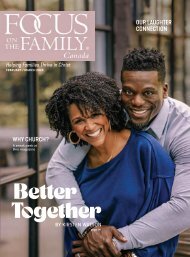Championship Fathering
Whether you're a fatherhood rookie or a field-battered veteran, this practical, inspiring guide will turn the business of being a dad into one of your greatest pleasures. Joining the Championship Fathering team will change your whole family—and maybe even generations to come.
Whether you're a fatherhood rookie or a field-battered veteran, this practical, inspiring guide will turn the business of being a dad into one of your greatest pleasures. Joining the Championship Fathering team will change your whole family—and maybe even generations to come.
You also want an ePaper? Increase the reach of your titles
YUMPU automatically turns print PDFs into web optimized ePapers that Google loves.
<strong>Championship</strong> <strong>Fathering</strong><br />
Copyright © 2008 by Carey Casey<br />
All rights reserved. International copyright secured.<br />
Focus on the Family and the accompanying logo and design are federally registered<br />
trademarks of Focus on the Family, Colorado Springs, CO 80995.<br />
A Focus on the Family book published by Tyndale House Publishers, Carol Stream,<br />
Illinois 60188<br />
TYNDALE is a registered trademark of Tyndale House Publishers, Inc. Tyndale’s quill<br />
logo is a trademark of Tyndale House Publishers, Inc.<br />
All Scripture quotations, unless otherwise indicated, are taken from the Holy Bible, New<br />
International Version®. NIV®. Copyright © 1973, 1978, 1984 by International Bible<br />
Society. Used by permission of Zondervan Publishing House. All rights reserved.<br />
No part of this publication may be reproduced, stored in a retrieval system, or transmitted<br />
in any form or by any means—electronic, mechanical, photocopy, recording, or<br />
otherwise—without prior permission of Focus on the Family.<br />
Cover design: Ron Kaufmann<br />
Cover photo of father and child copyright © by iStockphoto. All rights reserved.<br />
Cover photo of leather texture copyright © by Nick Schlax/iStockphoto. All rights reserved.<br />
Back cover texture copyright © by iStockphoto. All rights reserved.<br />
Author photo copyright © by Carey Casey. All rights reserved.<br />
ISBN: 978-1-58997-534-7<br />
Library of Congress Cataloging-in-Publication Data<br />
Casey, Carey, 1955-<br />
<strong>Championship</strong> fathering: how to win at being a dad / Carey Casey.<br />
p. cm.<br />
“A Focus on the Family book.”<br />
Includes bibliographical references.<br />
1. Fathers—Religious life. 2. Fatherhood—Religious aspects—Christianity. I. Title.<br />
BV4529.17.C37 2008<br />
248.8'421—dc22<br />
2008040733<br />
Printed in the United States of America<br />
1 2 3 4 5 6 7 / 15 14 13 12 11 10 09
“I first knew Carey Casey as a young man, preparing to attend seminary, and<br />
have always had the greatest admiration for him. He has a deep love for people<br />
and a desire to lead them, especially young men, to Christ. I would highly<br />
commend to you any book written by Carey Casey.”<br />
—BILLY GRAHAM<br />
“Carey Casey hits it out of the ballpark in his new book, <strong>Championship</strong> <strong>Fathering</strong>.<br />
This volume is chock full of practical information, exhortations, and<br />
examples from his own personal experience as a son and father. Perhaps most<br />
helpful is hearing about the simple yet profound ways that values were ‘caught’<br />
in Carey’s life and in the lives of his children. I encourage every father or fatherto-be—especially<br />
those among us who lacked a strong male role model growing<br />
up—to pick up this resource and heed its God-given wisdom.”<br />
—JIM DALY<br />
President, Focus on the Family<br />
“I’ve known Carey Casey for 30 years. He’s truly one of America’s most<br />
respected and trusted leaders. In <strong>Championship</strong> <strong>Fathering</strong>, Carey lays out<br />
three easy-to-follow, fundamental steps that will take every dad in the direction<br />
his kids and wife desperately need him to go. Carey is a true example.<br />
He is a fantastic dad and speaker and he loves God devoutly.”<br />
—JOE WHITE<br />
Founder of Kanakuk Kamps<br />
and author of Sticking with Your Teen<br />
“In <strong>Championship</strong> <strong>Fathering</strong>, Carey Casey lays out a vision for every dad—<br />
and for our nation. Having known him for 25 years, it is no surprise that<br />
Carey makes it plain for all dads. He brings the research-based principles of<br />
the National Center for <strong>Fathering</strong> to life with practical ideas that all of us dads
can use—regardless of our circumstances. Carey shows us that we can win this<br />
battle for our children’s future, and yes, that we can change the culture of<br />
fathering in our nation by living out the basics of <strong>Championship</strong> <strong>Fathering</strong>.”<br />
—DR. TONY EVANS<br />
Senior Pastor, Oak Cliff Bible Fellowship<br />
Dallas, Texas<br />
“I met Carey Casey when he was an 18-year-old running back playing against<br />
my team for the Virginia state high school football championship. Today,<br />
Carey and I are on the same team seeking a more important championship.<br />
This is our playbook. I hope you’ll join our team as we seek to become<br />
<strong>Championship</strong> Fathers.”<br />
—COACH HERMAN BOONE<br />
Head Coach, T.C. Williams Titans<br />
As dramatized in the film Remember the Titans<br />
“Fathers today need coaches who equip them to be effective dads. Carey<br />
Casey wants to be your coach for a championship season. I want to encourage<br />
you to get this book and join his team.”<br />
—DR. DENNIS RAINEY<br />
President, Family Life<br />
“Winning the Heisman Trophy and being an All-Pro Receiver are great honors,<br />
but my lifelong goal is to have my children tell me I’ve been a <strong>Championship</strong><br />
Father for them. Carey Casey has provided me—and you—with a<br />
great game plan to achieve that goal. If you want to be the dad your children<br />
need, <strong>Championship</strong> <strong>Fathering</strong> will help you get over the goal line.”<br />
—TIM BROWN<br />
Former NFL All-Pro Receiver and Heisman Trophy winner
This book is dedicated to my father’s dreams for me,<br />
to my father-dreams for my children,<br />
and to the father-dreams of every dad who reads these pages.<br />
May we be the generation that launches a culture<br />
of <strong>Championship</strong> <strong>Fathering</strong> in our land and beyond.<br />
-
Contents<br />
Acknowledgments . . . . . . . . . . . . . . . . . . . . . . . . . . . . . . . . . . . . . . . . . . ix<br />
Foreword . . . . . . . . . . . . . . . . . . . . . . . . . . . . . . . . . . . . . . . . . . . . . . . . xiii<br />
Introduction . . . . . . . . . . . . . . . . . . . . . . . . . . . . . . . . . . . . . . . . . . . . . . . 1<br />
1 From One Dad to Another . . . . . . . . . . . . . . . . . . . . . . . . . . . . . . 5<br />
2 <strong>Championship</strong> <strong>Fathering</strong>: What Is It? . . . . . . . . . . . . . . . . . . . . . 17<br />
3 Getting Involved with Your Kids . . . . . . . . . . . . . . . . . . . . . . . . . 27<br />
4 Love 101 . . . . . . . . . . . . . . . . . . . . . . . . . . . . . . . . . . . . . . . . . . . 41<br />
5 How to Love Your Children . . . . . . . . . . . . . . . . . . . . . . . . . . . . 51<br />
6 Loving Your Children’s Mother . . . . . . . . . . . . . . . . . . . . . . . . . . 69<br />
7 Coaching . . . . . . . . . . . . . . . . . . . . . . . . . . . . . . . . . . . . . . . . . . . 85<br />
8 Coaching with Insight . . . . . . . . . . . . . . . . . . . . . . . . . . . . . . . . . 97<br />
9 Modeling . . . . . . . . . . . . . . . . . . . . . . . . . . . . . . . . . . . . . . . . . . 115<br />
10 Modeling Faith and Values . . . . . . . . . . . . . . . . . . . . . . . . . . . . 135<br />
11 A Vision for the World . . . . . . . . . . . . . . . . . . . . . . . . . . . . . . . 157<br />
Epilogue . . . . . . . . . . . . . . . . . . . . . . . . . . . . . . . . . . . . . . . . . . . . . . . . 167<br />
Notes . . . . . . . . . . . . . . . . . . . . . . . . . . . . . . . . . . . . . . . . . . . . . . . . . . 170
Acknowledgments<br />
W<br />
hen you become “published,” suddenly you have to be an<br />
authority on whatever your book is about. So I enter this new<br />
arena with a bit of fear and trepidation. But I also do so with a great sense of<br />
calling, because responsible <strong>Championship</strong> <strong>Fathering</strong> is so vital to our future.<br />
As you’ll see in what follows, I’m an average dad who has been blessed<br />
to have some very good people around me. When I look at what is in this<br />
book, I realize that so many people have contributed to it in one way or<br />
another.<br />
First and foremost, I know who butters my bread, if you will. God has<br />
given me so many blessings in life, as well as the passion and vision for this<br />
work—starting even when I was a boy. For many years, I have always known<br />
that the greatest thing I can do in life is to be a man of God, a husband, and<br />
a father. That has always been part of what I wanted to do and be in life.<br />
My parents, Ralph and Sarah Casey, inspired me and never gave up on<br />
me even when others did. I was blessed to have them there. My bride’s parents,<br />
Dr. Perry and Mildred Little, were very dedicated parents and grandparents<br />
even in difficult circumstances. I thank my sister, Camellia, and my<br />
brother, Corwin, for being constant sources of support. And I’m grateful to<br />
the other members of what is, in my experience, the greatest family in the<br />
world: Melanie, my bride of more than 30 years; Christie and her husband,<br />
Shunton; Patrice, her husband, John, and my grandson, John-John; my son<br />
Marcellus, his wife, Stephanie, and our granddaughter, Salem Miel; and of<br />
course Chance, who helps me keep my fathering fresh.<br />
I am grateful for those who serve or have served on the staff at the<br />
National Center for <strong>Fathering</strong> since my arrival—great people who work tirelessly<br />
and who have helped me learn more about myself and about fathering<br />
than I ever thought I could. My friend and partner, Peter Spokes, the president
x<br />
Acknowledgments<br />
at the Center, gives me great confidence as CEO because I know he will dot<br />
all the i’s and cross all the t’s to keep the place running smoothly. Brock<br />
Griffin, our staff writer, helps me bring the message off the page and make<br />
it plain for our readers and radio listeners; his work shows up throughout<br />
this book. Others who have served here during my tenure include Brian<br />
Blomberg, Lucy Bloom, Cathy Henton, Amos Johnson, Ron Nichols, Maya<br />
Ostema, Bea Peters, Vera Lu Pollard, Sherri Solis, Debbi Swirczynski, George<br />
Williams, Steve Wilson, and George Young. Members of our WATCH<br />
D.O.G.S. team include Chris Danenhauer, Scott Dorf, Samuel Barnes,<br />
Frank Hannon, Shelly Perry, and Eric Snow.<br />
We have also been blessed to have board members who have given of<br />
their time, talents, and treasure to help fulfill the mission of the National<br />
Center. Our current board members include Blake Ashdown, Ron Blain,<br />
David Carr, Steve Cox, George Garza, Dr. Peter LeDoux, Lee Paris, Mario<br />
Shane, Greg Solis, and Jason Wingard. Dr. Rich Hosley, Joel Jennings, and<br />
Sam Mathis also served on our board during my time here.<br />
Others have helped us along the way with enthusiastic support and<br />
encouragement—including Russell Brown, Rich Hastings, Lloyd Hill, Joe Lee,<br />
Drew Maddux, Chip and Debbie Mahon, Gretchen Mahoney, Al Mueller,<br />
Kevin and Lisa Olsen, and Denny and Allyson Weinberg.<br />
It’s an honor and privilege to follow the Center’s founder, Dr. Ken<br />
Canfield, a man with such passion and grace. From the Center’s beginning<br />
in 1990 until the end of 2005, he raised the banner for fatherhood and prepared<br />
the way for the great things God has in store for us in the years to<br />
come.<br />
I have had the privilege of working with quality people throughout the<br />
process of writing this book—including Steve Smith, a friend from years ago<br />
here in Kansas City, who believed a Carey Casey book was worth pursuing<br />
and promoted the idea to his colleagues at Focus on the Family. The other<br />
staff we have worked with at Focus—Larry Weeden, John Duckworth, Jim<br />
Daly, and others—have also conducted themselves with excellence and class.<br />
Thank you for seeing the need in our culture for <strong>Championship</strong> Fathers and
Acknowledgments<br />
xi<br />
for taking on this project. Neil Wilson of The Livingstone Corporation drew<br />
from his giftedness and passion to put my ideas into words that have real<br />
purpose and clarity. Thanks also to my friend Tony Dungy for being a great<br />
model as a father and for contributing the foreword for this book.<br />
I am indebted to many fine people who have invested in me and who<br />
have really helped to raise my family and me. During my junior year in high<br />
school, I was introduced to a great organization called the Fellowship of<br />
Christian Athletes, and I have been associated with it in some way ever since.<br />
My lifelong friends there are too numerous to name, though I do want to<br />
mention former CEO Dal Shealy and former Dallas Cowboys Coach Tom<br />
Landry, who was very active with FCA. Coach Landry was a father figure to<br />
me, and actually passed away on the same day my own father died; both<br />
were men of God, 75 years of age, and had been married to their brides for<br />
more than 50 years. Alicia Landry is still an encouragement to our family.<br />
Thanks to Wayne and Ann Gordon and the entire Lawndale Community<br />
Church family in Chicago. Wayne held me accountable every day to be<br />
a good husband and father while we served together there. I would also like<br />
to mention others who have invested in my life through the years: Dr. James<br />
Braxton and First Baptist Church in Salem, Virginia; the people at the Mount<br />
Hebron Baptist Church in Garland, Texas; my father in the ministry, Dr.<br />
Charles Briscoe, and Paseo Baptist Church in Kansas City; Pastor Paul Brooks<br />
and our church family at First Baptist Church Raytown; Jim Haney and the<br />
National Association of Basketball Coaches; and Coach Herm Edwards and<br />
the Kansas City Chiefs.<br />
Thank you all. You are a great encouragement to me.
Foreword<br />
by Tony Dungy<br />
Head Coach, Indianapolis Colts<br />
I<br />
remember being on the podium during the victory celebration after<br />
our team won the 2007 Super Bowl. As I stood there in the middle<br />
of all that noise and confetti, I thought about all the people who helped<br />
me along the way. Probably more than anyone else, I thought about my dad.<br />
He died in 2004, but I really wish he’d been there to celebrate with me.<br />
I learned so many lessons from him.There were numerous times when he<br />
helped me talk through my disappointments. He attended all my games when<br />
I was growing up, but it was the experiences going to and coming from the<br />
games—riding in the car and walking back and forth to the fields—that have<br />
really stuck with me. We would talk about everyday issues and questions, and<br />
often more important topics would come up—like academics, what I wanted<br />
to do in life, how to treat people, and so many things that I still apply today.<br />
I know how blessed I was to have a father like that, and I see many young<br />
men today who didn’t have that blessing or those benefits. Probably three<br />
out of four young players who come to our team don’t know what it’s like to<br />
have an involved father. We can talk to them about football and they track<br />
with us pretty well. But when we talk in the meetings about life issues and<br />
character and other things they need to be successful, it’s obvious that many<br />
of them haven’t had that.<br />
Those young men are regular reminders for me of how vitally important<br />
fathers are in our society. We can look at many of the other problems we’re<br />
facing for confirmation of what happens when a dad isn’t there: violence in<br />
our cities, overpopulated prisons, out-of-wedlock births, and many other
xiv<br />
Foreword<br />
consequences. If we don’t do something to reverse these trends, our society<br />
will likely be in for some real trouble.<br />
In coaching terms, maybe we’re in the locker room after a tough first<br />
half. My message to all you men on the <strong>Championship</strong> <strong>Fathering</strong> team would<br />
be, “We’ve got to stop the momentum against us and then turn it in a better<br />
direction and start gaining ground.”<br />
You have to start in your own family and nurture your own children.<br />
Then, realize that there are many people who are going to grow up without<br />
their biological dad. Someone’s got to help in that capacity, whether it’s a<br />
mentor or a relative, a friend, a neighbor, a teacher. We’ve got to have men<br />
like you stepping into the gap.<br />
I believe this book will play a key role in helping us turn the tide, both<br />
in our homes and in our society. The research-based outline of loving, coaching,<br />
and modeling makes a lot of sense to me. Loving a child and showing<br />
him that you care is the most important thing a father can do. If your children<br />
don’t think you care, then no matter what gifts you give them, no matter<br />
how much you’re around, you’re not going to be able to teach them and<br />
have a positive impact on them. But when they know that you really, really<br />
care about them, that’s when your words and the message you’re trying to get<br />
across will sink in. Even if they’re like I was and they don’t necessarily accept<br />
everything right away, they’ll still be influenced and come back to it.<br />
This can be done in a lot of ways. I’m one of the most old-school people<br />
you’ll ever meet, but I have a 16-year-old son who likes to communicate<br />
by texting. So even though it isn’t my thing, I’m learning how to do it, with<br />
all the little abbreviations. I’m trying to come into his world a little bit, and<br />
that’s one way I show him that I care about him.<br />
I can also see many ways in which good coaches and good fathers have<br />
similar goals. Both involve teaching and trying to get the best out of individuals,<br />
getting them to play up to their potential. Both also aim at getting<br />
each person to see that the team is important, that togetherness and unity as<br />
a family is what it’s all about.<br />
And our modeling is vitally important. Girls need dads to show them
Foreword<br />
xv<br />
how women should be treated by men, so they know what to look for in<br />
relationships and will wait for the right type of guy. Boys need to understand<br />
who they are as males, to see what it means to grow up in a society and how<br />
to be a family man, finding fulfillment in family relationships instead of looking<br />
for man-to-man bonding in gangs or other unhealthy places.<br />
I see it on our team all the time, and it’s true for fathers as well: People<br />
follow the leadership they get, whether it’s positive or negative. The leaders<br />
of the team or the family will take them in one direction or another. As<br />
fathers, it’s so important to model responsible living and demonstrate positive,<br />
godly manhood for our children.<br />
I learned how to be a father from good models—my father and others.<br />
They included men like Clyde Christensen, who has coached on my staff for<br />
all the years I’ve been a head coach. His daughters were a couple of years<br />
ahead of mine, so I watched him go through the process and asked him questions.<br />
He kept the same schedule I did as a coach—working hard and working<br />
long hours—yet he showed me how to be there to nurture my girls and<br />
pray for them. He set a great example that I have been able to watch for 13<br />
years so far.<br />
I encourage you to find someone like Clyde—a committed father in a<br />
situation much like your own, but a few years ahead of you in the journey.<br />
Whether you’re a new father, a divorced dad, someone who travels a lot for<br />
work, a blended-family father, or whatever, find that other dad and watch<br />
him carefully. Ask him questions about his secrets and how he’s overcome<br />
major challenges. You need those insights and that support.<br />
I believe this book will be a good start for that. You’ll learn a lot about<br />
fathering from the research of the National Center for <strong>Fathering</strong> and the stories<br />
that Carey Casey shares. You might think of Carey as a more experienced<br />
dad who’s taking the time to unload some wisdom on you. Soak it all in, and<br />
then talk about it with other dads you know.<br />
Carey has been another positive model for my fathering. When I was an<br />
assistant coach in Kansas City, we attended the same church and would often<br />
get together with our families. I’ve watched and admired the way he and
xvi<br />
Foreword<br />
Melanie have raised their kids, so I know he has the kind of practical, handson<br />
wisdom that will help you.<br />
In addition, and probably just as important, I’ve seen how Carey has<br />
placed himself in positions to help others. That’s his passion; that’s what is on<br />
his heart. His life has always been about making a difference for God’s kingdom,<br />
from his years at Lawndale Community Church in Chicago to his role<br />
at the Fellowship of Christian Athletes—and now as CEO at the National<br />
Center for <strong>Fathering</strong>. Carey will tell you that, in his case, CEO stands for<br />
“Chief Encouragement Officer,” as he is encouraging dads to create a culture<br />
of <strong>Championship</strong> <strong>Fathering</strong>.<br />
In a day when we often talk about kids who aren’t getting proper fathering,<br />
I believe it’s time to take more of a lead from the guys who are doing it<br />
well. We should commend them, but also look at what they’re doing and<br />
say, “This is what we should strive for. This is the model.”<br />
I know Carey is not only saying it when it comes to <strong>Championship</strong><br />
<strong>Fathering</strong>; he’s done it and he’s still doing it. I trust that this book will help<br />
you become that kind of father as well.
Introduction<br />
“B<br />
oys, let’s go for a drive.”<br />
I lost count of how many times my father used those words to<br />
begin what turned out to be a teaching time. Now that my father is no longer<br />
with us, I can’t tell you how much I would give to hear those words again.<br />
It took me awhile to catch on. The idea wasn’t really about going for a<br />
drive. Pop was a lot more subtle than that. He was creating a captive audience<br />
in the car, where he could “school us up” on something he’d been thinking<br />
about.<br />
He’d slip it into the conversation without making a big announcement.<br />
He wouldn’t even change his tone of voice. He’d say, “You know, boys, it<br />
would break my heart if I ever heard that you hurt a young lady in any way.”<br />
Or, “If it ever got back to me—and you know it would get back to me—that<br />
you boys were messing with drugs, we’d have to do some serious business.<br />
Know what I mean?”<br />
We would nod our heads. Pop always meant what he said.<br />
I want to be like my dad in many ways, but I don’t take my kids out for<br />
drives. My young son, Chance, and I walk to the park. I used to take my older<br />
kids to fast-food places where we did some fast schooling. Eventually, just like<br />
me, they caught on.<br />
What are you hoping your kids will catch on to? Have you repeated certain<br />
phrases or habits in an effort to teach father-lessons your kids will<br />
remember? If your kids are grown, do you hear them quoting you—maybe<br />
to kid you, but also showing they haven’t forgotten and that they “got it”? I<br />
hope so.<br />
Do you mind if I join you for a while? Let’s go for a drive. I’m glad you<br />
picked up this book and I hope we connect as you read it.
2 Introduction<br />
I have conversations with fathers almost every day. I’m amazed by how<br />
much we have in common. It doesn’t matter what our backgrounds, racial<br />
origins, or careers happen to be. Being dads creates a bond.<br />
We have at least one shared experience: For most of us, fatherhood<br />
turned out to be different from the way we thought it would be. Some of the<br />
difference was good, and some was not so good. Most of us wish someone<br />
had sat us down and schooled us about what it was like to suddenly be Dad.<br />
Some of us had a dad or grandfather who gave us some clues about<br />
fathering. But very few of us ever had a conversation that started something<br />
like this: “Son, someday you’re going to be a father. When that child starts<br />
calling you ‘Dad,’ here’s what I want you to remember.”<br />
If you did have a conversation like that, I hope you can remember what<br />
came next—because it’s probably gold! But whatever your preparation for<br />
fatherhood, this book can be a series of conversations about the most important<br />
aspects of fathering that some of us have learned about along the way.<br />
Think of each chapter as you and me taking a drive.<br />
Even though I’m the chief executive officer at the National Center for<br />
<strong>Fathering</strong>, I don’t consider myself an expert. But I’ve got years of practice<br />
and access to a lot of help from the National Center. What you’ll read in<br />
these pages is the result of research and the experiences of many dads including<br />
myself. Many of the stories are mine, but the ideas have been tested and<br />
proven by generations of fathers.<br />
I realize most men don’t take time to read introductions to books, so let<br />
me keep this one short.<br />
I don’t believe there is a greater challenge a man can take on than the task<br />
of being a husband and father. Sooner or later, and more often than you<br />
expect, fatherhood will take the best you can give—and then some.<br />
But there’s help out there! I’ve sure needed a lot of it along the way. I trust<br />
this book will provide some for you.<br />
Good fathering, even <strong>Championship</strong> <strong>Fathering</strong>, is within your reach. It<br />
doesn’t matter where you’re starting as much as it matters how you finish.<br />
We’ve all got a lot to learn. We can learn it from each other’s failures and
Introduction 3<br />
successes. We can help others along the way even while we make progress<br />
ourselves.<br />
So let’s get started—or let’s keep going!<br />
And when someone calls you Daddy, here are some things I want you<br />
to remember . . .<br />
—CAREY CASEY<br />
National Center for <strong>Fathering</strong><br />
www.fathers.com
CHAPTER ONE<br />
-<br />
From One Dad<br />
to Another<br />
A<br />
s my co-workers at the National Center for <strong>Fathering</strong> know, I tend<br />
to use illustrations from the world of sports. That’s because (1) I’m<br />
familiar with athletics, and (2) I know a lot of guys would rather talk sports<br />
than talk fathering.<br />
I like to do both.<br />
Until I was seriously injured while playing football for the University of<br />
North Carolina, involvement in athletics was a significant part of my life.<br />
That allowed me to move into some unusual territory. I was LawrenceTaylor’s<br />
first roommate in school long before he was a New York Giant or headed for<br />
the Hall of Fame. In fact, I was an upperclassman starter when L.T. was wondering<br />
if he would make the team!<br />
Later I spent several decades working for the Fellowship of Christian<br />
Athletes. And over the years, I’ve been privileged to be a chapel speaker for<br />
every team in the National Football League.<br />
That’s why I’ve been able to count well-known coaches and players<br />
among my friends. The picture collection on our refrigerator at home features<br />
not only our children but also the families of sports figures with whom we’ve<br />
shared our lives. This might sound glamorous, except that we know these<br />
celebrities as people—as mothers, fathers, and children.<br />
One of those people was Reggie White.
6 CHAMPIONSHIP FATHERING<br />
A <strong>Championship</strong> Father<br />
Reggie White played with the Philadelphia Eagles, Green Bay Packers, and<br />
Carolina Panthers—and was an ordained minister. Every so often, he’d help<br />
me out as a guest speaker. When he visited, he never stayed in a hotel. He<br />
always wanted to stay in our home. When I went to visit him, it was the<br />
same. At one point, my bride, Melanie, and I had to put a king-sized bed in<br />
our guest room for the times when Reggie stayed over.<br />
Reggie White was a giant of a man. But he never considered himself too<br />
important to learn more about fatherhood.<br />
Reggie had grown up without positive fathering role models. But he was<br />
persistent in trying to find strong father figures by choosing mentors.<br />
I believe that’s why he liked staying in our home. I think he wanted to<br />
see family. He wanted to see how I as an older guy (maybe six years older)<br />
managed my household and raised my kids. He was always searching, seeking<br />
to get better beyond football—and fathering was one area in which he<br />
was determined to improve.<br />
I was sort of a brother and a father figure to Reggie. He could ask me<br />
things, tell me things, share and be honest with me. I was an on-call friend.<br />
We didn’t talk a whole lot, but when we did the conversations were about<br />
things that mattered.<br />
One fatherly trait I observed in Reggie was that he knew how to have fun<br />
with our children. When he was with them, he was a big kid. I’m six-oneand-a-half—but<br />
I’m also fifty-two years old, so it’s tough getting on the floor.<br />
This dude was six-five, three hundred and some pounds, and he would hit<br />
the carpet with my children, ready for tumbling and wrestling even after he’d<br />
played a football game or had a workout. As cool and big-time as he was,<br />
Reggie knew how to have fun with kids.<br />
Sadly, Reggie passed away in 2004. And sadly, when I look into the<br />
faces of an NFL team today, what I still see most clearly are the effects of<br />
fatherlessness.<br />
Some of the faces are those of wealthy young men drifting without
From One Dad to Another 7<br />
dads—and becoming fathers themselves without a clue about what to do<br />
next. They’re idolized on life-sized posters, but I know they’re still little boys,<br />
wondering where Dad is and why he doesn’t seem to care.<br />
But I also see men like Reggie—young fathers who want to do better<br />
than was done for them. They’re eager for principles and insights that will<br />
help them break the cycle of disappointment from their pasts.<br />
Wherever you are in the fatherhood process, hope begins with what you<br />
do as a father from now on. I want you to know what I tell those NFL players:<br />
<strong>Championship</strong> <strong>Fathering</strong> is a longer-lasting achievement than anything<br />
that happens on the field.<br />
Players who’ve won a championship trophy or ring often declare, “No<br />
one can ever take that away from me.” That’s right. People can’t take that<br />
away, but they can certainly forget what you’ve done. The crowd has a short<br />
memory, and what it remembers is always selective.<br />
Your kids and grandkids, on the other hand, are in a very special category.<br />
They’re an audience like no other. When all is said and done, you want<br />
them to remember you in the best way—as a <strong>Championship</strong> Father. That’s<br />
something worth keeping for eternity.<br />
Are You <strong>Championship</strong> Material?<br />
I meet men all the time who admit they’re defeated by their shortcomings as<br />
fathers. They often feel they’re simply repeating the failures of their dads.<br />
Many bear deep wounds, pain, and resentment toward their fathers. They<br />
don’t know where to begin to make it right. Maybe that’s where you’re stuck<br />
right now.<br />
There’s a lot of practical help in this book, but to begin with I need to<br />
give you permission and encouragement to be a father. Start being Dad.<br />
Your past failures can’t erase the biological fact, and your future failures<br />
don’t mean you can’t do your best. You may not even know where your kids<br />
are right now, but you can accept the truth that you are their father. Begin<br />
with that fact; let it sink into your heart.
8 CHAMPIONSHIP FATHERING<br />
In these pages we’ll look at the patterns of fathering, not the occasional<br />
highlight or blooper. Establishing and maintaining a pattern of responsible<br />
fathering takes long-term discipline, and it doesn’t depend on any single victory<br />
or mistake.<br />
I don’t know about you, but it’s easy for me to think of something good<br />
I did as a father and then hang my case on that: “Remember that amazing<br />
weekend we went skiing together? That was really fun, wasn’t it? Doesn’t that<br />
prove I’m a good dad?”<br />
That series of questions has a logical answer, though your children may<br />
not dare to say it: “Yeah, Dad, that was a great weekend. Where were you the<br />
other 51 weekends of the year?”<br />
You and I can’t get fatherhood right by doing it well a couple of times,<br />
and we can’t ruin it with a couple of failures, either. Kids are amazingly forgiving<br />
and resilient—more than we deserve!<br />
What they deserve from us is a pattern of consistency. Our goal is to<br />
adjust that pattern into one that gives our children something they need<br />
most—a dad committed to <strong>Championship</strong> <strong>Fathering</strong>.<br />
He Taught Me Everything I Know<br />
Reggie White wasn’t the only <strong>Championship</strong> Father I’ve met. When you<br />
come right down to it, virtually everything I know about fathering I saw in<br />
my dad.<br />
It took me a long time to realize it, but almost every new lesson I learn<br />
about fathering I can see illustrated somehow in my dad’s life. That doesn’t<br />
mean I think Ralph Casey was perfect. He made his share of mistakes, but I<br />
know I can learn even from those. I have access to a lot more information<br />
than he did, but he got things right more often than not.<br />
For example, Pop blended his roles as dad and grandfather in ways that<br />
still amaze me. One of our last conversations took place while he lay in his<br />
hospital bed as his body and brain were gradually shutting down. He held my<br />
hand and looked at me in a way that told me he was still all there. Squeez-
From One Dad to Another 9<br />
ing my hand and with a twinkle in his eyes and a slur in his speech, he said,<br />
“Doooon’t provoooke your children to anger!”<br />
As I stood looking down at him, I realized he wasn’t just trying to tell me<br />
something about my role as a father. He was telling me one of his personal<br />
codes of conduct. I thought back over my life as his son, remembering times<br />
when I did get angry with him. But it wasn’t because he’d provoked me; it<br />
was because I knew he was right and wasn’t quite ready to agree with him.<br />
One of those times came during high school. I’d been playing football,<br />
had experienced some success—and developed a little attitude. I was fortunate<br />
to be at a school with a respected football program, but began to think<br />
the coach didn’t appreciate my abilities as much as he should. I wasn’t playing<br />
as often as I thought I deserved to play, so I complained.<br />
The coach was a white man, and all my black buddies were telling me<br />
to quit the team. We agreed that the way he was treating me must mean he<br />
was a racist. My friends said, “Carey, don’t play for that white coach. You<br />
don’t need him.”<br />
Their advice sure sounded like the way to go. So I came home, spitting<br />
that venom and sharing with my father my plan to quit the team.<br />
Dad listened until I had it all out of my system, then shook his head.<br />
“Son,” he said thoughtfully, “that man is a good coach. He’s going to win<br />
football games with or without you. He doesn’t need you. You need the team<br />
more than the team needs you.”<br />
He was right. At that moment I needed someone who could see the bigger<br />
picture. That was Pop.<br />
I stayed on the team and played for that coach. Much to my amazement,<br />
I improved and he gave me more playing time. Eventually I got a<br />
scholarship and played in college—where I met my bride.<br />
Football gave me connections I never could have made otherwise. They<br />
all go back to that conversation with Pop; his words literally changed the<br />
course of my life. I can only imagine where I’d be today if I hadn’t taken his<br />
advice. And the older I get, the more quickly I want to agree with him.<br />
My father built into my life the view that learning doesn’t stop. Right up
10 CHAMPIONSHIP FATHERING<br />
until he died, he was pouring wisdom into my mind. He’s my greatest example<br />
of what <strong>Championship</strong> <strong>Fathering</strong> is all about—not just because he was<br />
a good dad, but because he taught me that becoming one is all about doing<br />
it better and never quitting. If being relentless isn’t part of your profile for<br />
fatherhood, it’s time to add it!<br />
Pop understood the necessity and principles of responsible fathering,<br />
even though we didn’t use those terms to talk about it. He was practical,<br />
down to earth—and experience only helps me understand and appreciate<br />
him better.<br />
In preparing this book, I’ve repeatedly found myself wondering what<br />
Pop would say about this or that. I’ll mention him often because even when<br />
he wasn’t perfect (and there were plenty of times when that happened), he<br />
remains my best example.<br />
Living the Dream<br />
God must have thought I’d need more than the examples of my dad and<br />
Reggie White. He gave me a good dose of equal-opportunity fathering experience,<br />
allowing my bride and me to bring four children into the world—two<br />
daughters and two sons. He also lets me serve as CEO of the National<br />
Center for <strong>Fathering</strong>, speaking to various audiences about being a dad and<br />
meeting with many groups about concerns affecting fathers.<br />
I’m living out my dream. Every time I speak on fathering, I can hear my<br />
dad talking about my future and saying I’d be part of a large challenge. Pop<br />
planted that dream in me.<br />
Like you, though, I can’t forget that my ultimate audience consists of<br />
my children. They motivate and evaluate my progress as a dad. They make<br />
sure I get plenty of practice. And they help define and refine my purpose as<br />
a father.<br />
They know I want to become a better and better father—and grandfather.<br />
The arrival of grandchildren has made me aware in a new way of all<br />
that comes with the gift of life.
From One Dad to Another 11<br />
I realize now that my Pop understood what happens when your home<br />
is invaded by your first baby grandchild. That little creature creates what a<br />
friend of mine calls “happy chaos.” When my siblings and I gathered in his<br />
home with our families, Pop would sit quietly in the middle of that riot,<br />
looking around and smiling. He must have been thinking, What on earth<br />
can I say in all this joy when no one is particularly interested in listening to me<br />
at this moment?<br />
Now I know that his silence was wisdom, for dads and granddads, too.<br />
There’s a time to speak and a time to be quiet, and Pop knew how to do<br />
both. He could be a rock in our family gatherings that the rest of us flowed<br />
around, as he said a word here or there or pulled someone aside for a little<br />
talk. He was in the center without being the center of attention.<br />
I’m writing, in part, so that my kids will have a better idea what I’m<br />
thinking when I’m quietly smiling in the middle of that joyful chaos. I’m<br />
writing for my grandchildren and great-grandchildren, too.<br />
And I’m writing for you. So many dads I talk to want to know that<br />
<strong>Championship</strong> <strong>Fathering</strong> is doable. We won’t be perfect at it, but we can get<br />
better—a lot better. That’s what I’m hoping for you!<br />
Three Little Words<br />
Most of this book is about the three fundamental parts of <strong>Championship</strong><br />
<strong>Fathering</strong>: loving, coaching, and modeling.<br />
The National Center for <strong>Fathering</strong> didn’t pull these three words out of<br />
a hat. We interviewed and surveyed thousands of fathers and some children<br />
as well, finding that these three areas are crucial. It’s a short list, so you and I<br />
can remember it. Once you know it, do it, and continuously improve at it,<br />
you’ll be giving your kids the kind of fathering they need—even when they<br />
don’t realize it!<br />
Loving, coaching, modeling. As soon as you read those words, you probably<br />
had some idea of what I’m talking about. I don’t doubt that you could<br />
come up with a definition of what it means to love, coach, and model.
12 CHAMPIONSHIP FATHERING<br />
But maybe you haven’t thought a lot about how those terms apply to<br />
your role as a father. So I’d like you to put your definitions on hold as you read<br />
the rest of this book.<br />
Sure, you’ll read some things about loving, coaching, and modeling that<br />
will cause you to think, Yeah that’s what I thought, or even, That ain’t news to<br />
me, man! But I promise you there’s more. I can promise that because I’ve discovered<br />
when it comes to fathering, there’s always more to learn.<br />
When I first started hanging out with the folks at the National Center<br />
for <strong>Fathering</strong>, I had to put my ideas about being a good dad on hold for a<br />
while, too. I had to be schooled in the basics. I had to learn new ways of<br />
thinking and look at familiar relationships with new ideas in mind.<br />
All this made me appreciate my upbringing and experiences even more,<br />
and in ways I’d never considered. After all, one thing that good research does<br />
is to help us see the obvious much better.<br />
This is my desire for you: that your understanding of loving, coaching,<br />
and modeling will get a lot wider and deeper than it’s ever been before. I want<br />
to build on what you already know, using the discoveries of many men who<br />
are pulling for you to succeed in your pursuit of <strong>Championship</strong> <strong>Fathering</strong>.<br />
Our research continues to confirm that loving, coaching, and modeling<br />
are the foundation of understanding and practicing what our children need<br />
from us as dads. That’s why we’ll devote several chapters to these three components.<br />
But I need to tell you right off the bat that these three factors don’t<br />
stand alone, like rock, paper, and scissors. They overlap. Sometimes we can’t<br />
tell where loving stops and coaching starts. At other times we may think we’re<br />
being loving but our kids are “reading” us as models. That’s why you can<br />
patiently explain something to your child (as a wise coach would), assuming<br />
that he or she thinks, Wow, my dad sure knows a lot about the internal combustion<br />
engine, while he or she is really thinking, Wow, I have no idea what<br />
Dad’s talking about, but I know he loves me.<br />
Our job description is loving, coaching, and modeling. None of these<br />
parts is optional. We can’t just love and skip the coaching or modeling. We’re<br />
doing better or worse in each of them, all the time.
From One Dad to Another 13<br />
It may help to picture the three components of <strong>Championship</strong> <strong>Fathering</strong><br />
as the individual supports on a three-legged stool. If one leg is missing or<br />
too short, the stool will tip. As you read this book, you may discover you<br />
haven’t been paying much attention to at least one of the “legs.” That area will<br />
need your special consideration.<br />
Fortunately, overlap can work in your favor, too. A loving dad usually<br />
practices coaching and modeling. A dad excels in coaching when he actively<br />
loves his kids and is a model for them. And you can’t help being an outstanding<br />
model when you’re loving and coaching.<br />
What You Got, What You’ll Give<br />
<strong>Championship</strong> <strong>Fathering</strong> is about your legacy, too.<br />
Politicians are asked what kind of legacy they think they’ll leave behind,<br />
but it usually sounds like a long-term public relations program—a sort of<br />
permanent popularity. With this kind of legacy, your family and close friends<br />
may be pretty disgusted with your life but everyone else can think you’re<br />
wonderful! That’s not the kind of legacy I have in mind. I’m thinking of one<br />
that leaves a deep, meaningful, positive mark on the people who know you<br />
best.<br />
Heritage is the legacy you’ve received. It’s not a hot subject today, since<br />
it sounds like something you store with antiques in the attic or basement. We<br />
live such uprooted lives that it often seems we came from nowhere and no<br />
one; we just showed up in our neighborhood one day. People rarely talk about<br />
their ancestors, often seeming embarrassed or ignorant or angry about their<br />
personal pasts.<br />
I don’t know about you, but that’s not the kind of heritage I’ve received<br />
or the kind of legacy I want to leave behind. I know I’ve been blessed with a<br />
rich heritage, having been entrusted with my father’s reputation and my family’s<br />
history. As I try to be a good keeper of what I’ve been given, I need to<br />
make sure I expand that heritage and leave a strong legacy for my children.<br />
I recognize the painful fact that a lot of dads don’t have the benefits of a
14 CHAMPIONSHIP FATHERING<br />
positive heritage. But I want to inspire and equip you as a dad to transform<br />
whatever heritage you’ve received into a positive legacy for your children and<br />
grandchildren. The past doesn’t have to have the last word on the future of<br />
your family. You can help reverse the fathering deficit that seems so prevalent<br />
in our culture. It’s really the best gift you can give your children.<br />
I’ve gotten to know a number of men whose heritage was nothing short<br />
of a handicap. Their fathers and grandfathers didn’t seem to care what kind<br />
of legacy they were passing on. But I’ve seen these men take on the challenge<br />
of making things different for their own children. I’ve watched them day by<br />
day, patiently taking sad and shameful heritages and creating legacies that<br />
would make their children proud and healthy adults. For your kids’ sake,<br />
don’t get so hung up on your heritage that you fail to shape your legacy.<br />
At the National Center for <strong>Fathering</strong> we often picture legacy-leaving as<br />
a huge relay marathon in which each generation is represented by a leg of the<br />
race. Each runner passes the baton to the next. The question for each of us<br />
is, What kind of legacy will I pass on to those after me?<br />
You can’t change your heritage, but you can greatly affect the impact of<br />
your heritage through the legacy you add to it.<br />
The Job You Can’t Avoid<br />
You may be wondering right now if it’s worth even trying to be a <strong>Championship</strong><br />
Father. Your own father may have been such a disappointment that<br />
you’re reluctant to wear the title of “Dad.” Maybe he didn’t give you much<br />
to work with in developing your own legacy.<br />
Don’t give up.<br />
If you have a child, the question isn’t whether you’re a father. It’s how<br />
you’ll do the job you can’t turn down—and whether you’ll allow yourself to<br />
enjoy it.<br />
Fathers have one unavoidable role: They teach. They teach when they’re<br />
there, and when they’re not. They even teach when they’re never there.<br />
Fathers teach well or poorly. They coach through what they say and don’t
From One Dad to Another 15<br />
say. They model by what they do or don’t do. You don’t have a choice about<br />
teaching; you’ll do it one way or the other. But what will you teach?<br />
You’ll leave your kids a legacy. You may have been left with little more<br />
than pain from those who went before, but that’s not what you have to leave<br />
your children. You can establish a new tradition. If fatherhood has been given<br />
a bad name in your family, you can be the one who makes it a position of<br />
honor and dignity. That’s a challenge worth a man’s best effort!<br />
I don’t know the details of what you’re facing as a father, and perhaps as<br />
a son. But I do know that the core principles of <strong>Championship</strong> <strong>Fathering</strong> will<br />
give you hope and direction. The fact that you’ve picked up this book and<br />
read this far tells me you have the desire that can turn you into a member of<br />
the <strong>Championship</strong> <strong>Fathering</strong> team.<br />
The First Day of the Rest of Your <strong>Fathering</strong><br />
The National Center for <strong>Fathering</strong> takes as its mandate words written by an<br />
ancient Jewish prophet who predicted what God had in mind for the future:<br />
He will turn the hearts of the fathers to their children, and the hearts<br />
of the children to their fathers. (Malachi 4:6a)<br />
I trust that by the time you’re finished with this book, your heart will be<br />
turned even more than it is now toward your children.<br />
It’s a father’s privilege and God-given challenge to take the lead in his<br />
kids’ lives. It will always be easier for their hearts to turn to you if they know<br />
your heart is filled with love for them.<br />
I also trust that you’ll decide to become part of the growing movement<br />
of <strong>Championship</strong> <strong>Fathering</strong>. Today is not too early—nor too late—to start<br />
being Dad!
<strong>Championship</strong> <strong>Fathering</strong><br />
A Call to Action<br />
You’ve read about the crisis of fatherlessness and the negative consequences<br />
for children and for our society. Even if you’re an involved dad, your children<br />
and grandchildren will grow up in a culture full of unfathered kids, and will<br />
be affected!<br />
Dads are a critical part of the solution, but we have to get involved. For<br />
the sake of our children and grandchildren and millions of other kids, we<br />
need to stand up and be counted.<br />
The National Center for <strong>Fathering</strong> is calling every dad to make a commitment<br />
to practice the five elements of <strong>Championship</strong> <strong>Fathering</strong>: loving his<br />
children, coaching his children, modeling for his children, encouraging other<br />
children, and enlisting other men to join the <strong>Championship</strong> <strong>Fathering</strong> team.<br />
Our goal is to recruit 6.5 million fathers—equal to 10 percent of the<br />
fathers in America. That’s enough dads standing shoulder-to-shoulder to<br />
stretch from Boston to San Diego. We believe it’s enough to create a culture<br />
of <strong>Championship</strong> <strong>Fathering</strong> and positively influence our children’s future.<br />
We hope this vision challenges and inspires you.<br />
Make a difference! Get in the game! Decide today to live the principles<br />
of <strong>Championship</strong> <strong>Fathering</strong>. To make your commitment, please visit<br />
fathers.com/cf.
About the National Center for <strong>Fathering</strong><br />
We believe every child needs a dad he or she can count on. The<br />
research is clear: children thrive when they have an involved father—<br />
someone who loves them, knows them, guides them, and helps them<br />
achieve their destiny. At the National Center for <strong>Fathering</strong>, we inspire and<br />
equip men to be the involved fathers, grandfathers, and father figures<br />
their children need.<br />
In response to the dramatic trend toward fatherlessness in America,<br />
Dr. Ken Canfield founded the National Center as a nonprofit, scientific,<br />
educational organization. Today the Center provides practical, researchbased<br />
training and resources that equip men in virtually every fathering<br />
situation to be the involved fathers their children need.<br />
The Center reaches more than one million dads annually through<br />
seminars, small-group training, the WATCH D.O.G.S. (Dads Of Great<br />
Students) program, our daily radio broadcast, and award-winning Web<br />
site and weekly e-mail. Our long-term goal is to create a culture of <strong>Championship</strong><br />
<strong>Fathering</strong> by encouraging 10 percent of dads to commit themselves<br />
to fulfilling the tenets of <strong>Championship</strong> <strong>Fathering</strong>.<br />
We focus our work in these four areas:<br />
Research<br />
At the core of all the National Center’s work is the Personal <strong>Fathering</strong><br />
Profile, a proprietary assessment tool that helps men understand their<br />
strengths and opportunities as fathers. Developed by a team of
esearchers led by the Center’s founder, Ken R. Canfield, Ph.D., the Profile<br />
provides insights for fathers and serves as the benchmark for evaluating<br />
the effectiveness of our father-training programs. The Center continues to<br />
partner with researchers and practitioners interested in expanding the<br />
knowledge base of the fathering field. Contact dads@fathers.com.<br />
Training<br />
The National Center for <strong>Fathering</strong> offers training through seminars,<br />
small groups, and train-the-trainer programs. We have reached over<br />
80,000 fathers through our seminars and equipped more than 1,000 trainers<br />
to provide our research-based father training in their local communities.<br />
Men interested in joining the Center’s team of trainers and father<br />
coaches should visit www.fathers.com/training.<br />
Programs<br />
The Center provides leading-edge, turnkey fathering programs that<br />
others can easily implement. At this writing more than 1,000 schools in 32<br />
states have WATCH D.O.G.S. programs. Visit www.fathers.com/watchdogs<br />
to learn about starting a program in your local school. The Center also<br />
offers a <strong>Championship</strong> <strong>Fathering</strong> small-group study as a companion to<br />
this book.<br />
Resources<br />
Our Web site at fathers.com provides a wealth of free resources for<br />
men in nearly every fathering situation—including new dads, granddads,<br />
divorced dads, stepfathers, adoptive dads, and father figures. Dads who<br />
make a commitment to <strong>Championship</strong> <strong>Fathering</strong> receive a weekly e-mail<br />
full of timely and practical tips on fathering. We also have a daily radio<br />
program that airs on more than 600 stations; selected programs can be<br />
downloaded from the Web site as podcasts.<br />
The National Center for <strong>Fathering</strong> operates with support from individuals,<br />
foundation and corporate grants, and earned income from contracts<br />
and resource sales. For more information about the National<br />
Center, visit www.fathers.com/aboutus.


